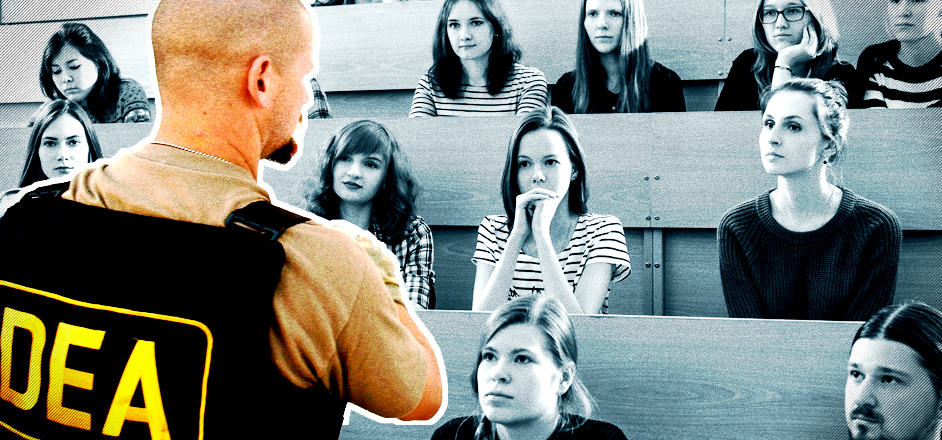In this segregated world, where we talk, tweet and message mostly to people who are a lot like us, there was a great moment the other day on the campus of the University of Colorado Boulder.
In a classroom, next to a blackboard with math equations, 11 students from the Students for Sensible Drug Policy talked about drugs with a former Drug Enforcement agent.
Talk about a difference. The former agent, Eric Rutherford, wore a flawless dark suit and slick black shoes, and had the salt and pepper hair of a man who's running for the Senate. The students, on the other hand, tended toward green hair, ironic mustaches and tie-dyed shirts typical of people who live in fear of the DEA busting down their doors to find their stash.
Just a few years ago, this agent could have been on their tails. Watching them talk to one another was like watching a lion discuss the finer points of hunting with a herd of gazelles, gazelles who wanted to point out the virtues of quietly eating grass.
In this moment, however, they were fearless. The normal power dynamics between cops and stoners, which would usually limit the students to whispering little more than “yes sirs” and “no sirs,” were eliminated. Here, they were equals, free to voice their opinions without the threat of getting locked in a cage.
On the Drug War, the two sides live in different universes. To Rutherford, drugs are life-wreckers and community destroyers, and he felt good about arresting, say, a heroin-dealing mother with two kids — if it kept drugs off the streets. To the kids, drugs are imperfect tools to enhance your life, as much a part of their normal lives as a Nintendo Switch or a drink on the weekends.
Both sides sought to humanize themselves. Rutherford told the students that "the DEA is people in our community" who "believed in our mission." He, for example, was a Marine and a college football player before joining the DEA. He retired in 2002. "Be real careful about blaming the DEA," he said. "They're just people like you and me."
Whereas the kids were telling him that drug users are people, too.
"People aren't dying from my marijuana use, and I'm a functional student with a 3.9 GPA," said a student named Emma, who didn't want her last name used here.
Rutherford countered: "Don't you think you'd be even more responsible and accomplished if you weren't using marijuana?"
Emma seemed insulted.

To these students, it's not the drug users who are bringing down society, it's the drug enforcement.
"Some of the laws the DEA enforces are some of the most egregious, anti-human laws that ever happened," said Clayton Ickes, the head of the student group.
Despite the disconnect, it was a discussion so much better than Reddit and Twitter discussion about drugs, where the two sides often shout and insult rather than talk it out.
Although oddly enough, this particular discussion ended just like every online discussion does, with one side calling the other a Nazi.
Rutherford was talking about how, despite their flaws, DEA agents are just doing their jobs.
"That's the argument the Nazis used!" said Ickes, "We're just doing our jobs!"
"Comparing the DEA to Nazis is just ridiculous," Rutherford said.
Shortly after that, the discussion ended — without any agreement on who is an who is not a Nazi.
There was one last opportunity for the two sides to come together. Asked if he had ever tried drugs, Rutherford said that he had, once, on a canoe trip as a young man because he didn't bring enough beer. It wasn't any good for him, he said. Just made him sleepy.
"Would you like to try again?" Ickes asked.
Rutherford declined. And a chance for reconciliation between two of America's great opposing forces was once again missed. And the Drug War rolls on.



Leave a Reply
You must be logged in to post a comment.